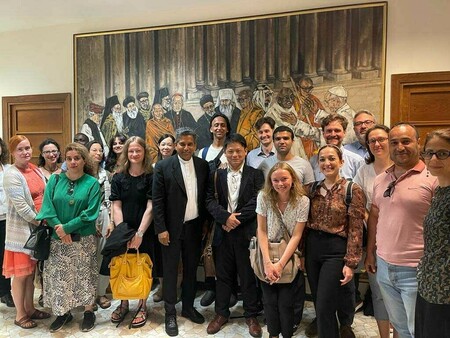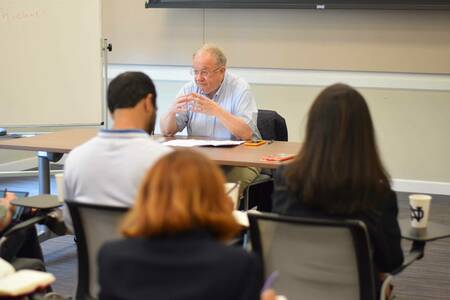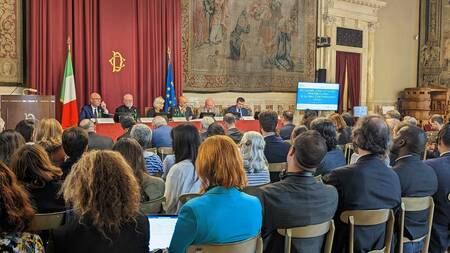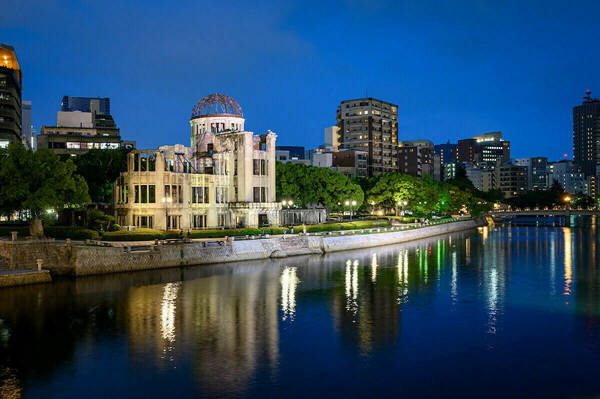Rome Global Gateway launches Rome Summer Seminars on Religion and Global Politics

In June, the University of Notre Dame’s Rome Global Gateway co-hosted the first edition of the Rome Summer Seminars on Religion and Global Politics. The two-week program welcomed 17 graduate students and postdoctoral fellows working at the intersection of religious studies and international affairs for a full schedule of writing workshops, graduate seminars and public events. The program included visits to the many sites that have made Rome a key hub for transnational and multi-religious policymaking, including the Great Mosque and Great Synagogue of Rome, the Vatican’s Dicastery for Interreligious Dialogue, the Community of Sant’Egidio and the U.S. Embassy to the Holy See.
“The idea of the Summer Seminars was to recognize the importance that Rome as a site for religious political activity has taken over the last 20 years,” Michael Driessen, director of the program, said. “Rome’s transnational nature has turned it into a central hub for religious political activity with many different resources, an incredible network of people, ideas and institutions at the intersection of religion and politics, and our hope was to take advantage of those resources, share them with the students and connect scholars and students who are working on similar projects.”
“Rome is a city of great history and very impressive architecture,” added Mahan Mirza, executive director of the Rafat and Zoreen Ansari Institute for Global Engagement with Religion in the Keough School of Global Affairs at Notre Dame. “Just being in this city gives you a real gravitas of both tradition and a central place of religion in the life of communities and of the world; coming to Rome inspires students to think about the role of religion in global politics.”

The students in the program represented 15 different nationalities, including Georgia, the Gambia, Iran, Taiwan, Lebanon, Algeria, Romania, the U.K., India and Pakistan, and hailed from a diverse array of universities such as Stanford, McGill, Göttingen, Notre Dame, Bouira and St. Andrews. Leading scholars in the field, such as Olivier Roy of the European University Institute, Kristina Stoeckl of LUISS, Jonathan Laurence of Boston College, Anna Rowlands of Durham University and Scott Appleby, the Marilyn Keough Dean of the Keough School of Global Affairs, provided lectures and seminars for the students. Public events were held at the Pontifical Gregorian University and John Cabot University, as well as at the Rome Global Gateway.
Rowlands said: “I think we are currently living in a moment, in terms of the academy and the world, where there is a deep need for interdisciplinary conversations about the role of religion and global politics. The Rome Summer Seminars in Religion and Global Politics has therefore been a fantastic opportunity to work with a group of junior and senior scholars together, covering a really wide and appropriately global context.”
The University of Notre Dame’s Keough School of Global Affairs and Rome Global Gateway were founding partners of the program, along with the Pontifical Gregorian University, John Cabot University in Rome, the Hanns Seidel Stiftung of Germany, the Adyan Foundation of Lebanon and the Royal Institute for Inter-Faith Studies. The program was also held under the high patronage of the Italian Ministry of Foreign Affairs, with special support from Andrea Benzo, the Italian special envoy for religious freedom and interreligious dialogue.

The program ended with a two-day international policy dialogue hosted by the Italian Institute for International Political Studies, a leading Italian think tank for international politics, and the Italian Ministry of Foreign Affairs on the theme of Religion, Conflict and Peacebuilding in Contemporary Global Crises. The conference’s opening session and keynote address by Archbishop Paul Gallagher, the Holy See’s secretary for relations with states, were held at the Italian Parliament and in Palazzo Montecitorio’s Sala della Regina, and institutionally hosted by the Italian Parliament’s permanent Committee for Foreign Affairs. Notre Dame’s Appleby also participated in a roundtable panel at the Italian Parliament following Archbishop Gallagher’s speech and offered a keynote address to students participating in the Rome Summer Summers.
Driessen said that he was deeply impressed by the commitment of the students attending the seminars and the quality of their research and projects. For more information about the 2024 Rome Summer Seminars and how to apply, visit the Rome Summer Seminars website.
Contact: Tracy DeStazio, assistant director of media relations, 574-631-9958 or tdestazi@nd.edu
Originally published by at rome.nd.edu on July 17.
Latest International
- University of Notre Dame joins the Global Coalition of Ukrainian StudiesThe University of Notre Dame has joined the Global Coalition of Ukrainian Studies after signing a memorandum of cooperation, formalized Sept. 24, at the Ukrainian Institute of America in New York City. Notre Dame joined four other American institutions that were also publicly welcomed to the coalition at this event: Arizona State University, Columbia University, Manor College and the Shevchenko Scientific Society.
- Statement from University President Rev. Robert A. Dowd, C.S.C., on the anniversary of the atomic bombing of HiroshimaToday, on the anniversary of the bombing of Hiroshima, Father Dowd offered remarks at the Elisabeth University of Music as a guest of its president, Yuji Kawano, and Bishop Alexis Mitsuru Shirahama of Hiroshima. Father Dowd focused on the role that universities can play in addressing the current nuclear predicament and the wider challenges of peace in today’s world.
- Vatican honors Martin and Carmel Naughton with papal awardThe late Pope Francis, in one of his last acts, conferred the honour of the Order of Saint Gregory the Great upon Carmel and Martin Naughton, Trustee Emeritus of the University of Notre Dame. The papal honor is in recognition of the Naughtons’ outstanding philanthropy in the areas of education and the arts, particularly in the provision of philanthropic support and scholarships to Catholic education at the University of Notre Dame and Kylemore Abbey, and in their transformative contributions to higher education in Ireland.
- Prioritizing prenatal care may decrease low birth weight outcomes in The Gambia, Notre Dame research findsA new study co-authored by University of Notre Dame researchers highlights the importance of prenatal care for improving the health of mothers and newborns, providing evidence that can inform policy.
- Navigating the waters of peace: Researchers address challenges, opportunities in implementation of Colombia's Peace AgreementNearly half of the commitments outlined in Colombia's historic peace accord face significant challenges and may not happen in time unless policymakers make several key interventions, warns a new report from Notre Dame's Peace Accords Matrix. The report offers a blueprint to salvage an accord that has lagged behind its implementation deadlines, putting its legacy at risk. It highlights timely fixes that can strengthen the agreement.
- Partial peace deals may facilitate comprehensive accords, offering roadmap for policymakers, practitionersPartial peace agreements — deals that address targeted issues on the way to larger comprehensive accords — could provide a blueprint for peacebuilding policymakers and practitioners, according to new University of Notre Dame research.













